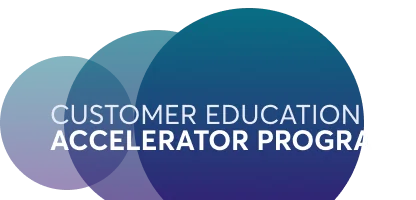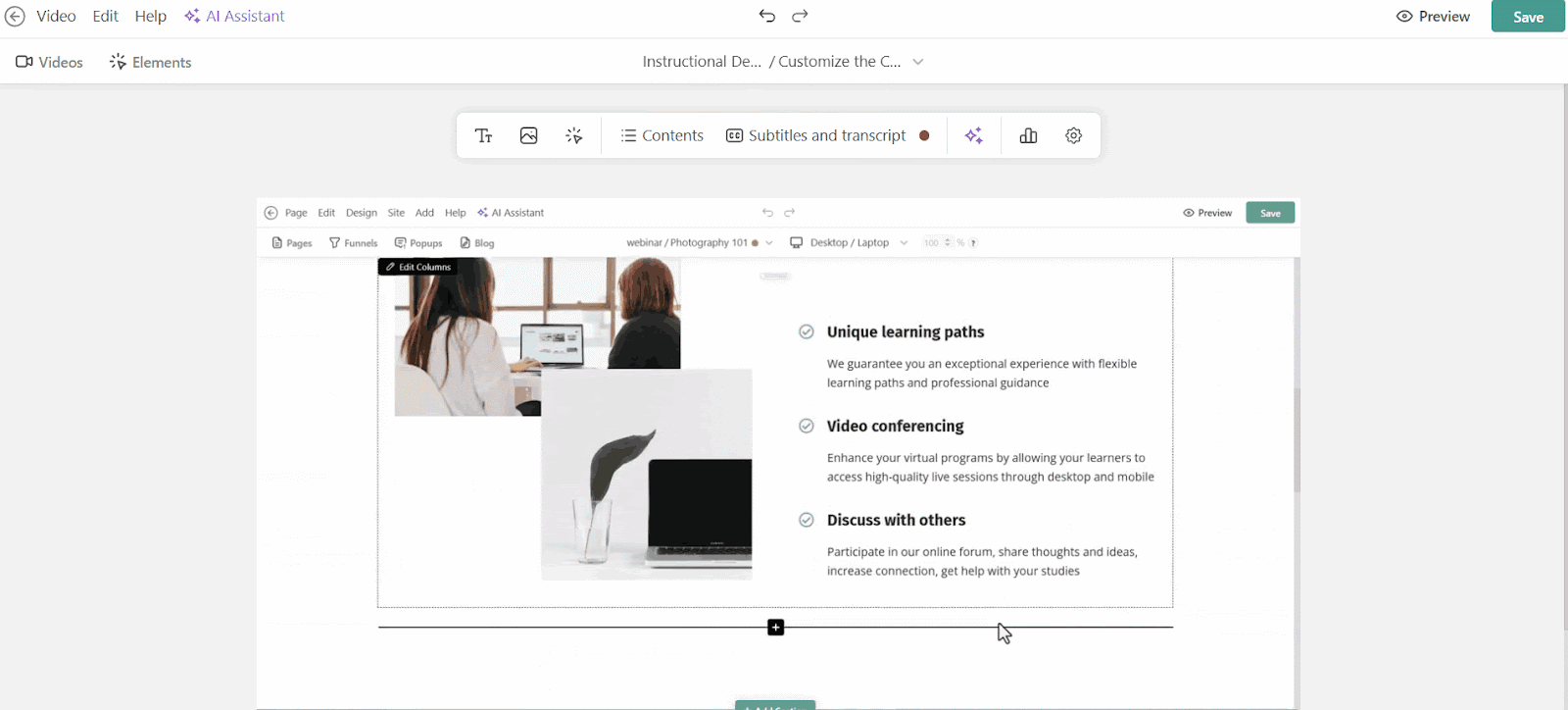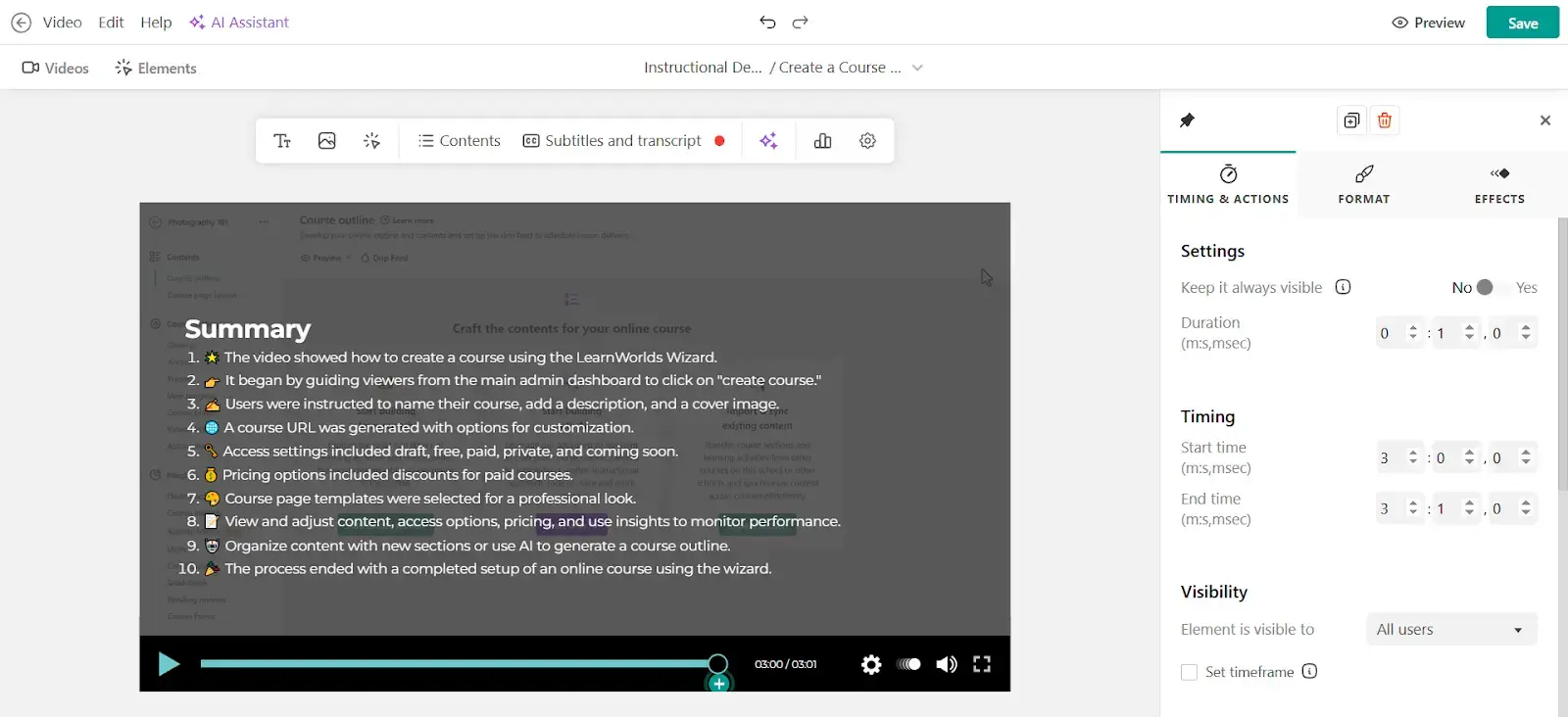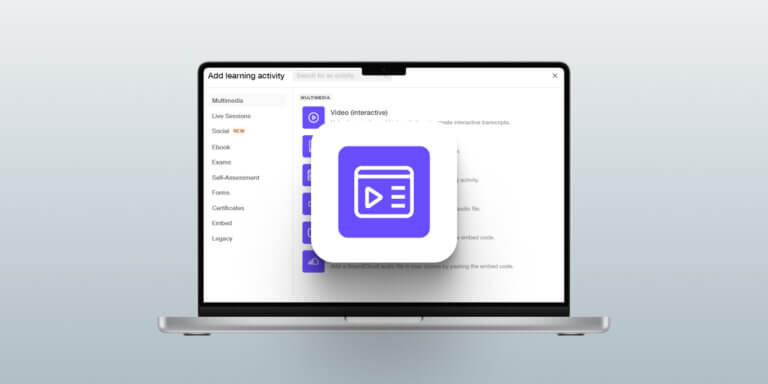How to enhance videos with AI to improve student engagement

Ever finished filming a course video, only to realize editing is the real challenge? Adding subtitles, translating for different languages, and making the content interactive can quickly turn into a full-time job. And you’re not alone. Educators everywhere are looking for smarter ways to enhance video quality and keep learners engaged.
It’s no surprise that AI in the media and entertainment market is booming, reaching $25.98 billion in 2024 and expected to hit $137.9 billion by 2033 [1] [2].
Let’s look at how you can improve your videos, save time, and create better learning experiences for your learners without the extra work.

What is AI video enhancement?
AI video enhancement refers to the use of artificial intelligence to automatically improve video quality, audio, and interactivity without needing advanced technical expertise. It’s an ideal solution for educators looking to build accessible and effective content faster.
What does AI video enhancement really mean for educators?
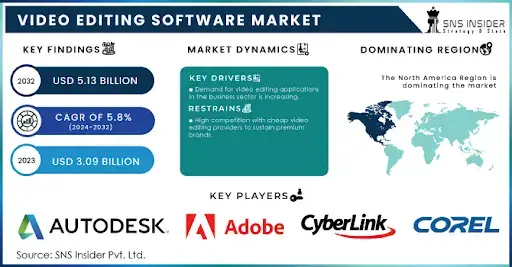
Unlike traditional video editing tools, which require step-by-step manual edits, AI video enhancers analyze your content and apply improvements based on built-in AI technology.
Here’s what these tools and their video editing features typically help with:
Next, let’s look at how these AI video enhancer tools can make a real impact.
The benefits of using AI to enhance videos
Using enhanced video AI tools to increase video quality helps you create learning experiences that are easier to follow, more accessible, and provide a more captivating viewing experience for a wide range of learners.
For educators, trainers, and instructional designers, AI video enhancement brings in advanced features that directly improve how content is shared and understood.
1. Better engagement with interactive features
Research shows that adding interactive elements to videos and turning passive video watching into an active experience improves learners’ engagement and learning performance [3]. Such interactive elements are quizzes and AI-generated questions or clickable buttons, and structured navigation.
2. Greater accessibility for all learners
Enhancing video accessibility with AI benefits everyone, not just those with specific learning needs. AI makes it simple to insert AI-generated subtitles and provide multilingual translations in the video playback, ensuring everyone can follow along, no matter their background.
3. Time-saving automation
AI video upscale tools reduce manual effort and time spent on video editing, offering advanced features such as improved audio and visual clarity, batch processing for handling multiple videos at once, and free preview options to adjust and ensure videos are uncompressed and without any unwanted parts for optimal visual quality.
Top 4 AI video enhancement tools for educators
Below is a comparison of popular AI video enhancers designed to support educators with useful features like automatic adjustments, interactive elements, and content personalization.
💡Looking for more tools? Explore our roundup for educators and content creators.
LearnWorlds’ AI-enhanced interactive video
LearnWorlds’ AI-powered interactive video elements help educators and course creators make videos more engaging and easier to follow without adding hours of extra work.
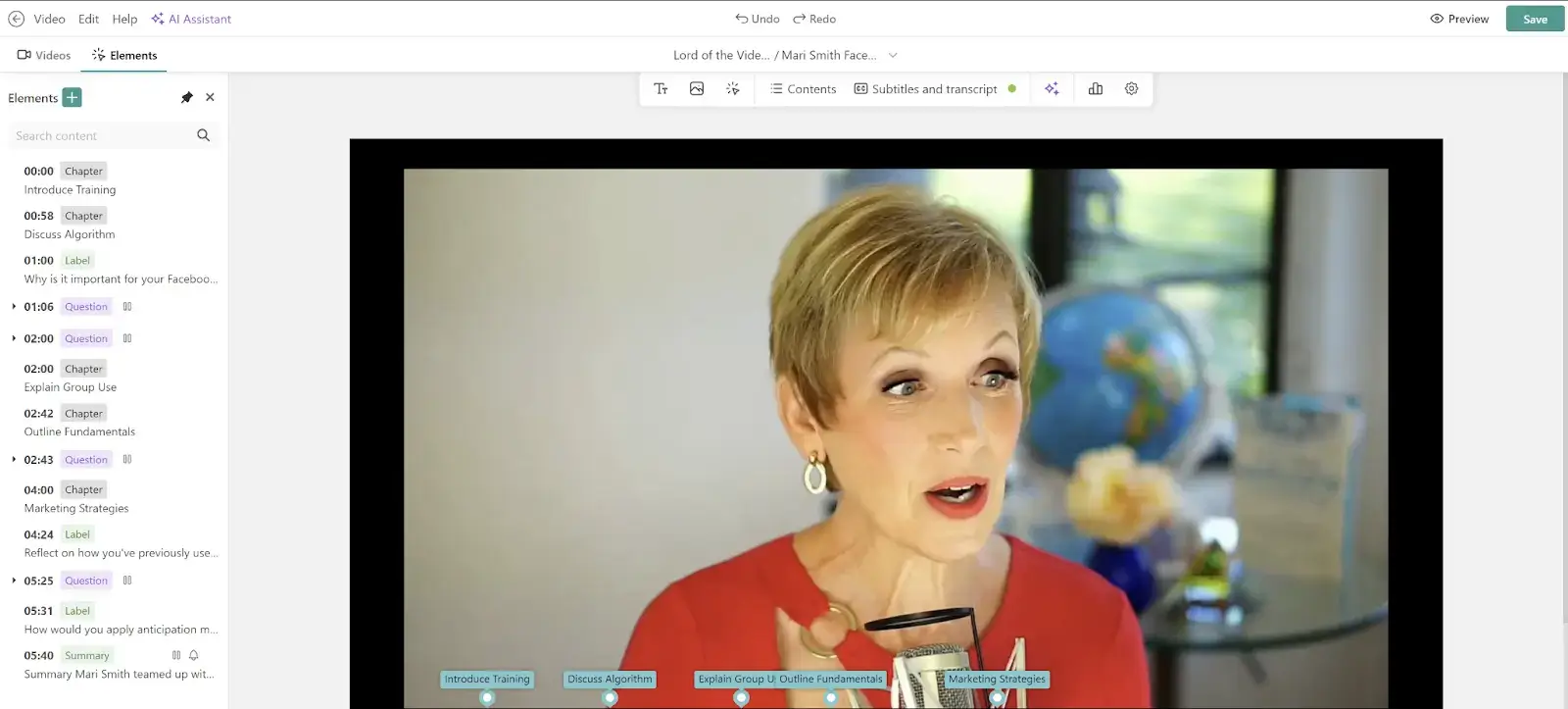
Here’s what’s included:
Pricing starts at 29€ per month.
*Pricing information retrieved from LearnWorlds on May 19, 2025
Topaz Video AI
Topaz Video AI is ideal for users who want to enhance video AI processes like upscaling and stabilization. It offers AI video quality enhancement features that correct and improve videos frame-by-frame, making it useful for educators working with archived content or low-resolution screen recordings.
It offers the functionality of tabs on which you can apply presets of filters that eventually allow you to easily compare the results of multiple changes on variations of your videos before exporting the most satisfying.
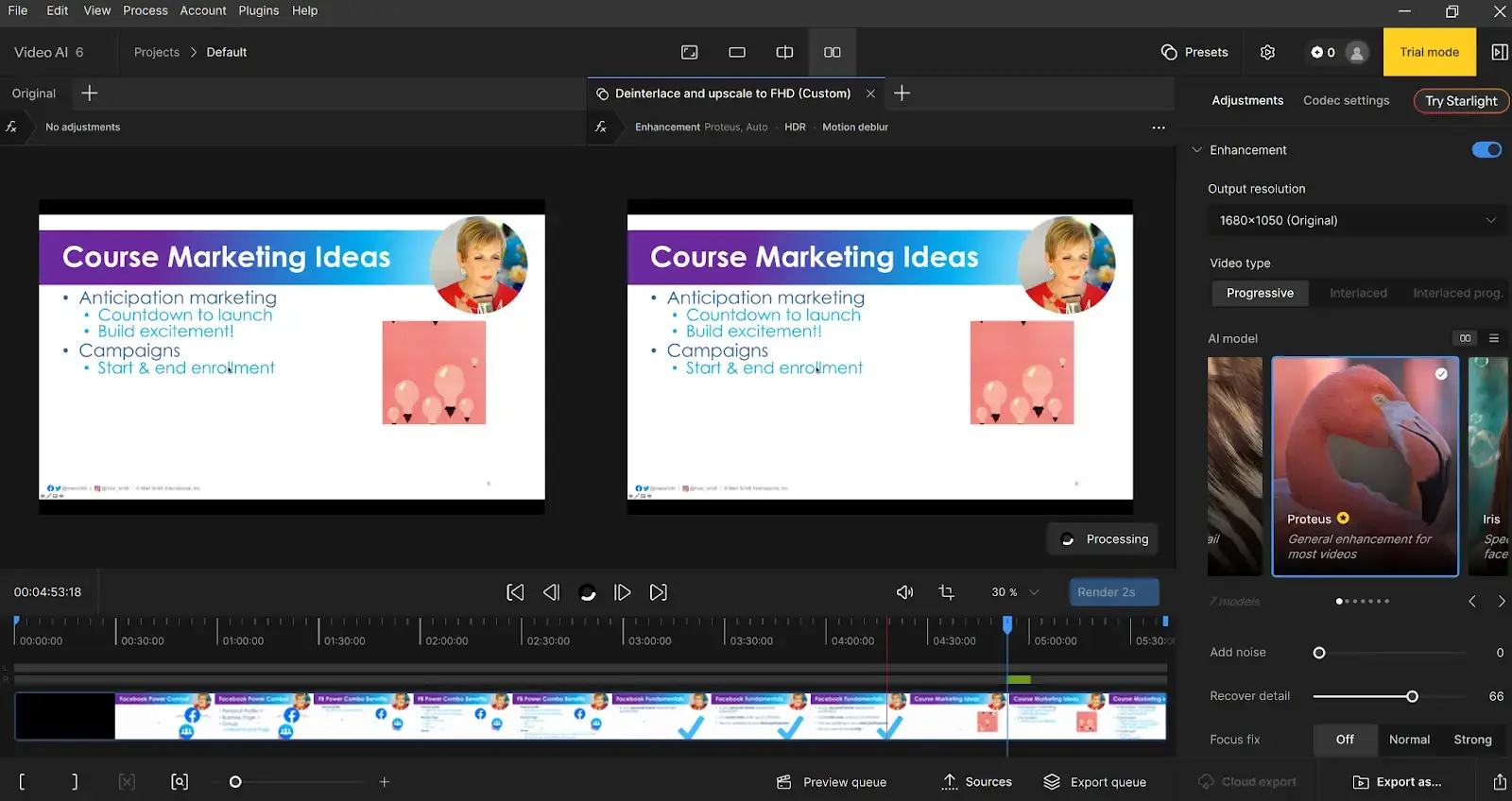
With Topaz, you can:
Pricing starts at $249 one-time licence.
*Pricing information retrieved from Topazlabs on May 19, 2025
PowerDirector 365
PowerDirector 365 offers a user-friendly video editing experience that blends manual control with AI-assisted features, making it suitable for educators who want to upscale video quality, manage editing tasks efficiently, and experiment with creative effects.
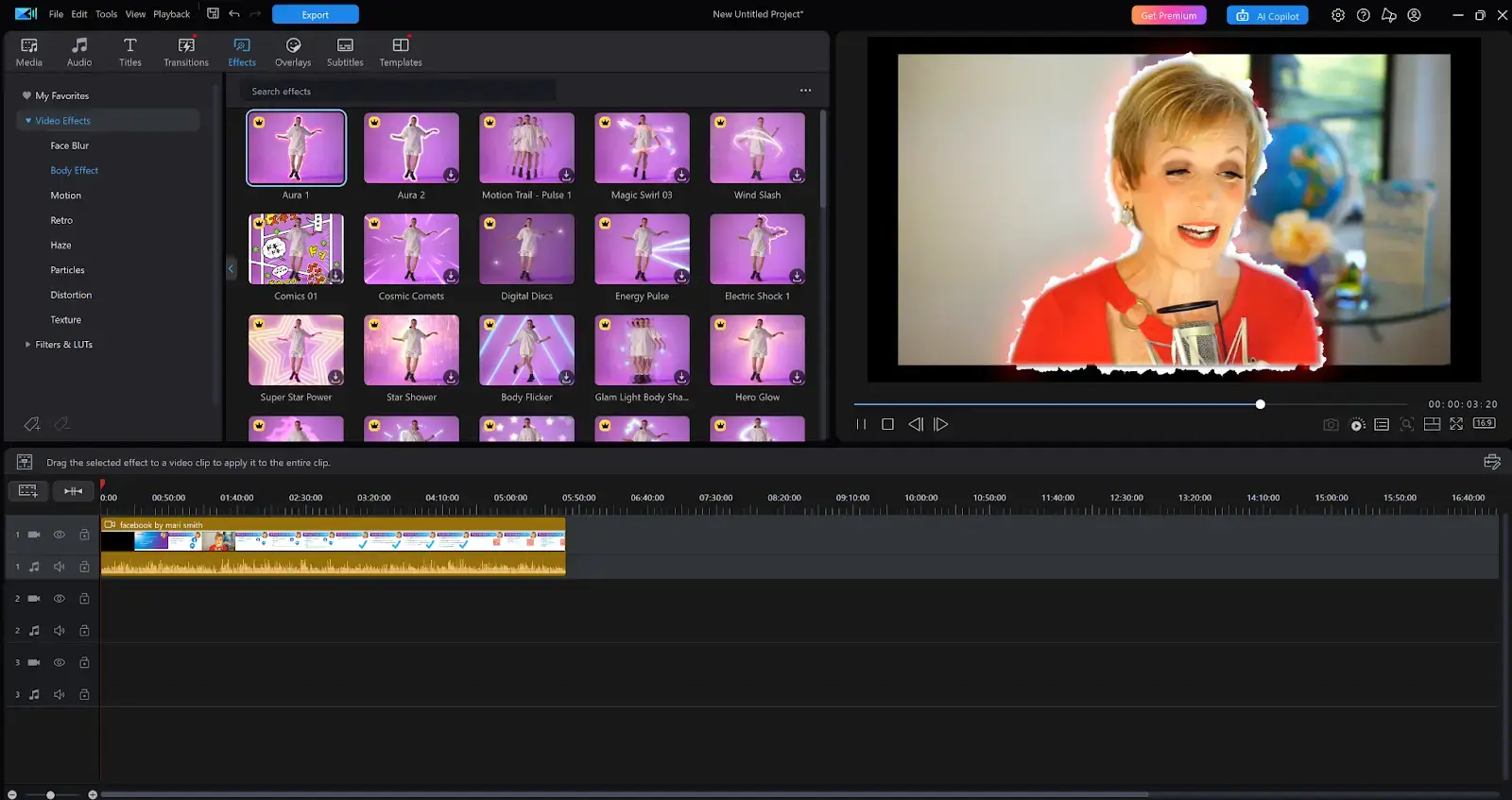
It includes a variety of practical tools for video editing:
Pricing starts at 19.99 €* per month.
*Pricing information retrieved from Cyberlink on May 19, 2025
AVCLabs video enhancer AI
AVCLabs video enhancer AI is perfect for improving the video quality of older, blurry, or low-resolution footage with minimal effort, allowing you to upscale video resolution significantly. It uses AI to automatically enhance video clarity, resolution, and visual consistency, making it ideal for repurposing archived content or personal recordings.
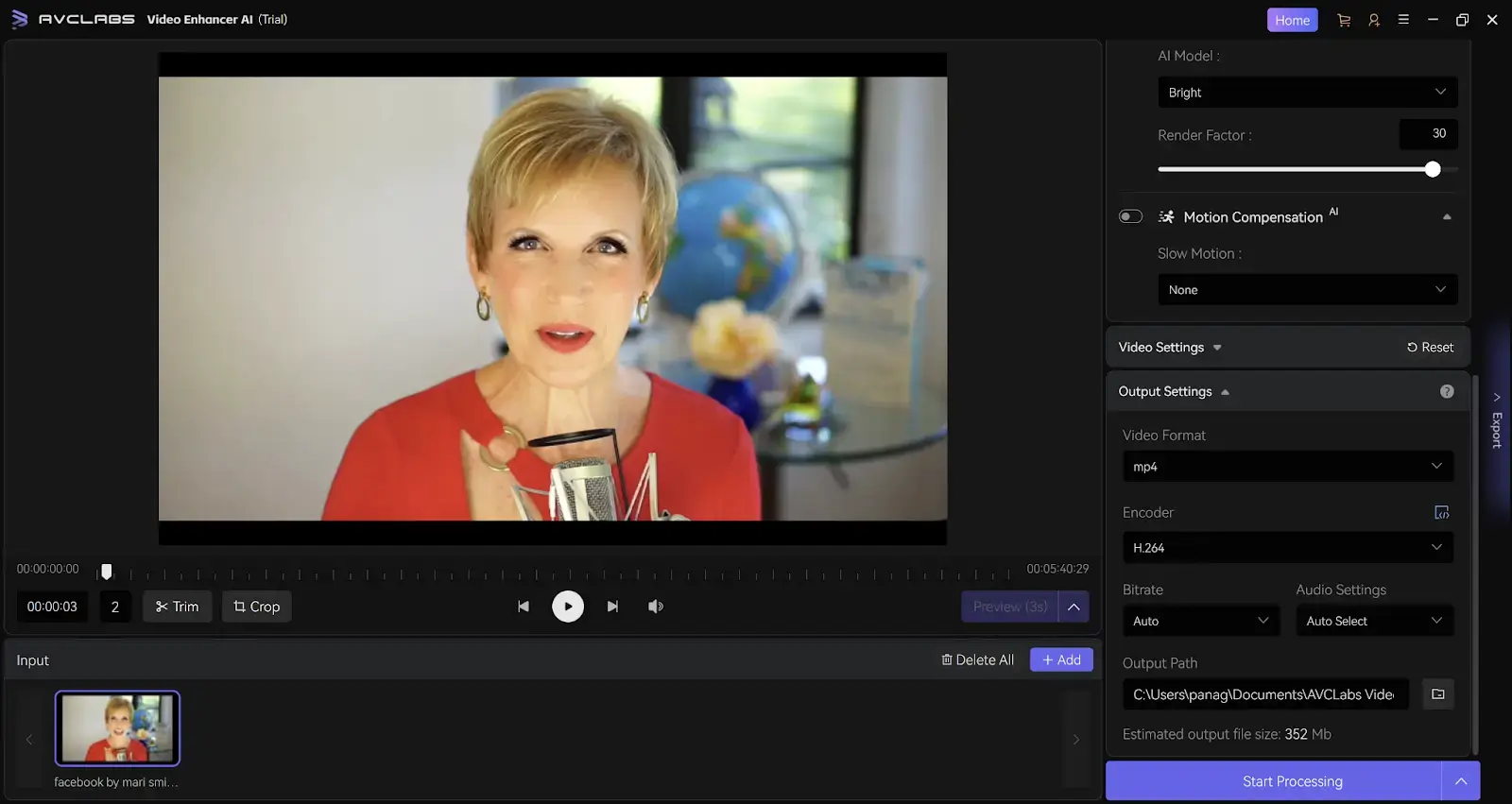
Key features:
Pricing starts at $39.95 per month.
*Pricing information retrieved from AVClabs on May 19, 2025
How to enhance videos with AI: A step-by-step guide
No matter the task, AI-based tools can help you enhance video quality, add interactivity, and increase accessibility without requiring advanced editing skills.
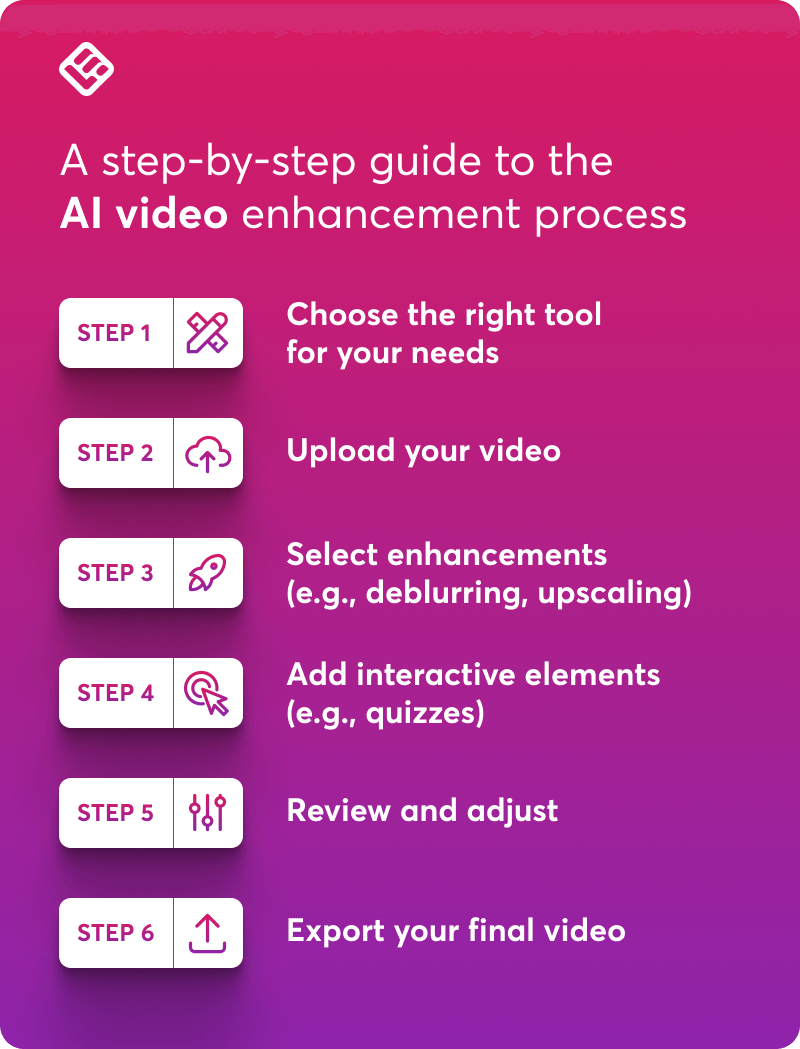
Here’s how to get started:
1. Choose the right tool for your needs
Start by deciding what you want to improve. Each tool has a different focus:
Pick the one that fits your teaching or content needs best.
2. Upload your video
After selecting your tool:
Most tools are compatible with various file formats, ensuring flexibility and accessibility for users.
3. Select enhancements
Choose the type(s) of improvements you’d like to apply:
If you’re working with older footage, tools like AVCLabs and Topaz Video AI help recover lost visual details without quality loss.
4. Add interactive elements (available in LearnWorlds only)
Platforms like LearnWorlds allow you to turn videos into guided learning tools, helping learners participate and stay focused.
Here’s what you can do:
💡This is a helpful step for anyone building self-paced courses or delivering training to a diverse, global audience. LearnWorlds handles the hard parts, so you can focus on teaching.
5. Review and adjust
Before exporting:
Most tools allow you to make manual changes even when features were added automatically.
6. Export your final video
Once your edits are complete:
You can also use a video converter to convert videos to different formats, ensuring compatibility across various devices and platforms.
💡If you’re new to creating instructional videos, check out our step-by-step guide on how to make a video tutorial for planning, recording, and editing tips.
Advanced techniques in AI video enhancement
For educators working with legacy content or delivering training in various environments, AI tools offer more than just surface-level improvements.
Let’s look at three advanced techniques that can help you bring clarity, accessibility, and structure to your videos, without reshooting or re-editing from scratch.
1. Upscaling resolution for older educational footage
Start by identifying videos that still deliver strong educational value but suffer from low visual quality. Upscaling resolution with AI online tools like AVCLabs or Topaz Video AI can transform standard-definition content into HD or 4K, restoring clarity without the need to re-record.
These tools reconstruct details frame by frame, making them ideal for refreshing onboarding modules, compliance videos, or evergreen training materials.
2. Noise reduction for clearer audio in training materials
Clear audio is essential for learner focus, especially in technical content. AI tools like PowerDirector 365 reduce background noise and enhance speech clarity by analyzing the full audio track and isolating the speaker’s voice, far beyond what manual filters or equalizers can do.
This improves both comprehension and accessibility across all learning environments.
3. Adding dynamic captions or interactive overlays
Dynamic captions and interactive overlays go beyond static subtitles by highlighting key terms in real time, displaying pop-up definitions, and linking to additional resources.
With LearnWorlds’ AI-enhanced Interactive Video, you can auto-insert summaries, questions, and CTAs, turning passive watching into active learning, ideal for walkthroughs, certifications, and skill-based training.
Use cases of AI video enhancement in education
LearnWorlds’ AI-enhanced Interactive Video is built for course creators and trainers who need to create high-quality learning materials without spending hours on manual editing. Below are three practical ways you can use these features today to improve content delivery, engagement, and accessibility.
💡Not sure how to structure your teaching videos? Learn the essentials of how to make educational videos that are clear, engaging, and pedagogically sound.
1. Enhancing online course videos
For educators offering self-paced courses, attention and completion rates are often a challenge. LearnWorlds’ AI tools allow you to transform traditional videos into guided learning experiences that help learners stay on track through AI-driven content engagement.
This is achieved through elements such as chapters, summaries, and questions.
2. Improving corporate training content
Trainers working with remote teams or compliance topics need to deliver content that is consistent, repeatable, and easy to update. With LearnWorlds, you can:
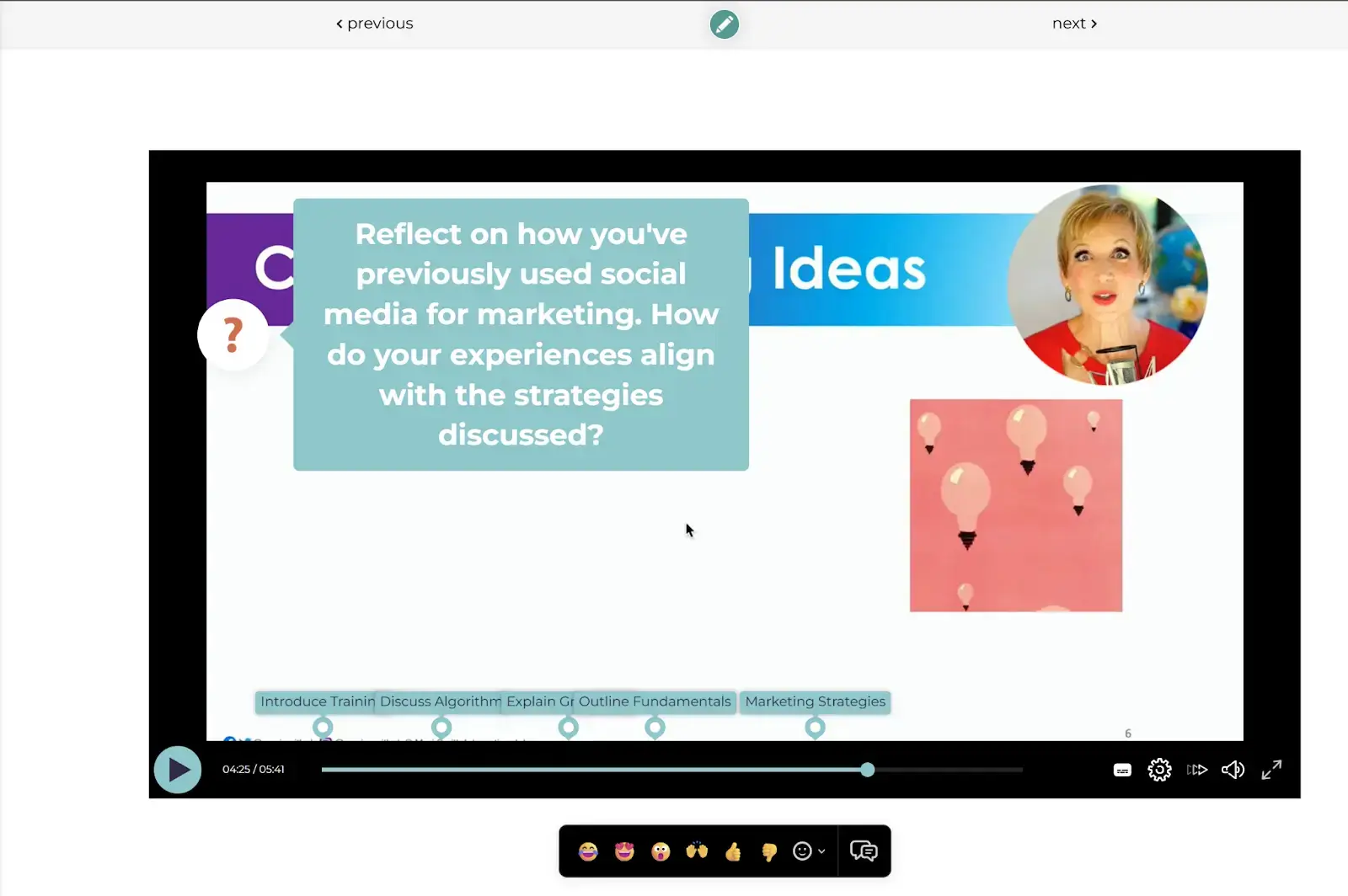
The ability to add multiple versions of subtitles also supports multilingual learners without creating separate video files.
3. Localizing videos for multilingual audiences
If you’re creating content for learners in different countries or with varied language needs, translation is often a barrier. LearnWorlds allows instructors to:
This simplifies content localization and helps you reach a wider audience while maintaining consistent quality and message.
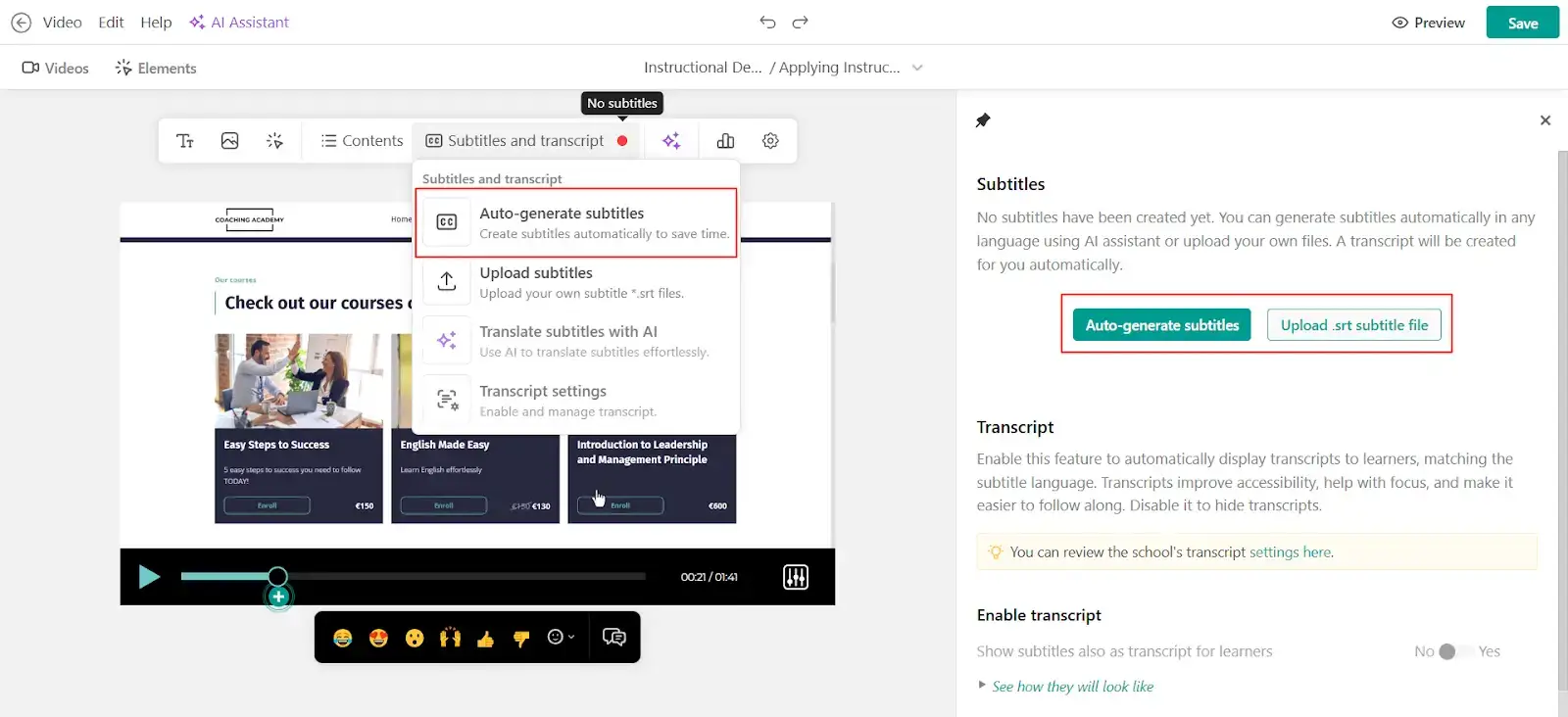
These use cases show how LearnWorlds makes it easier to build training videos that are accessible, interactive, and learner-friendly, without relying on advanced technical tools or external teams.
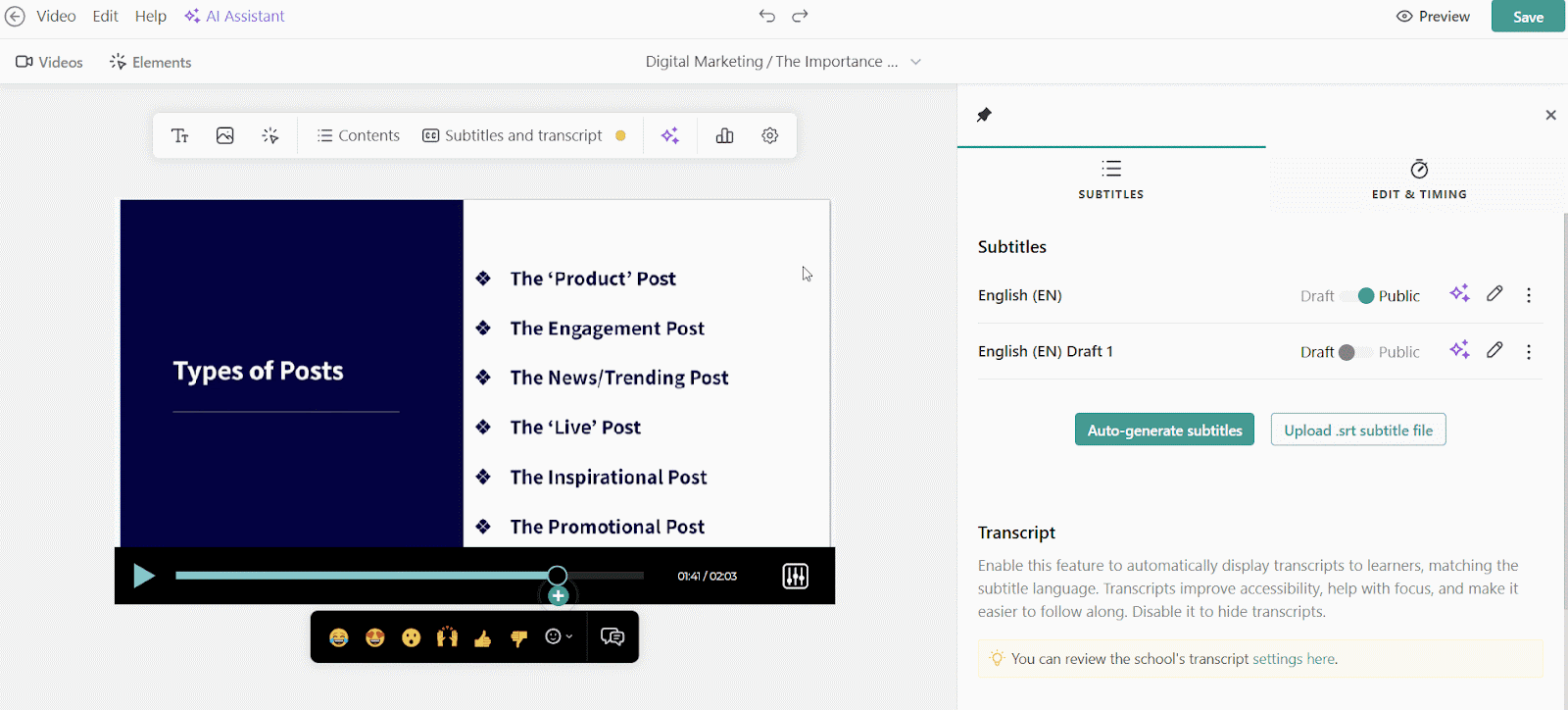
Best practices for creating engaging AI-enhanced videos
AI tools can help you deliver clearer, more interactive learning experiences, but getting the most out of them requires thoughtful planning.
Here are some best practices that will help you balance efficiency with a personal touch and use AI responsibly in your content.
1. Balance automation with personalization
While AI speeds up tasks like subtitles and quizzes, ensure your videos still feel personal:
2. Ensure ethical use of AI in educational content
AI is powerful, but it must be used thoughtfully:
💡Choosing the right format for your video is crucial—discover how to select your instructional video style to maximize learner engagement.
The future of AI in educational video creation
In the coming years, AI video-based learning will likely evolve in ways that allow for more flexibility, personalization, and accessibility, without increasing workload.
Here are two key directions worth watching:
1. Real-time video enhancement for live sessions
Emerging AI tools can make real-time adjustments during live sessions, such as:
Such adjustments are important because you won’t need to re-record or post-edit your content as much. Live teaching can become more polished and inclusive with minimal extra setup.
2. Personalizing learning paths based on video behavior
AI will tailor content based on how your learners interact with videos by:
These AI capabilities will make it easier for you to meet learners where they are, without having to manually analyze behavior or redesign your courses.
While the full potential of AI in education is still taking shape, it is clear that the future of video creation is becoming more supportive, responsive, and accessible for both instructors and learners.
💡For a broader look at trends in edtech, see how AI is disrupting online education.
Empower your educational content with AI
Creating effective video lessons once meant juggling editing tools, writing every quiz manually, and translating subtitles line by line. Today, smart tools can help you manage those tasks faster and consistently deliver quality online learning that drives better learner outcomes.
Here’s what we covered:
So, ask yourself, if you can do all this with less effort, why keep doing it the hard way?
Give LearnWorlds’ AI-enhanced interactive video a try to see how it can save you time while making your training more accessible and easier to follow.
Start your free trial today and start building video content your learners will actually enjoy and complete.
Sources
[1] AI In Media & Entertainment Market Size, Share & Trends Report [2] AI In Media & Entertainment Market 2024 [3] Instructional video in e-learningFAQ
Everything you have ever wondered, but were too afraid to ask...

